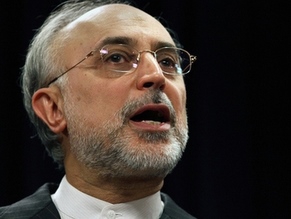|
World Jewish News

ran's Foreign Minister Ali Akbar Salehi speaking during a news conference in Ankara, Turkey. Thursday, Jan. 19. 2012. Photo by: AP
|
Iran 'optimistic' on future of nuclear talks with UN watchdog
28.02.2012, Israel and the World Iran's foreign minister said Tuesday that the Islamic Republic expected talks with the United Nations nuclear watchdog to continue, adding that it was optimistic that said negotiations would proceed in the right direction.
In the latest high-level talks between the IAEA and Iran, conducted in Tehran in January and February, Iranian officials stuck to a refusal to address intelligence reports about covert research relevant to developing nuclear weapons. Iran says its nuclear program is for peaceful energy purposes only.
"We expect the dialogue that has started will continue," Iran's Foreign Minister Ali Akbar Salehi told reporters after giving a speech to the UN-sponsored Conference on Disarmament.
"There was some disagreement on drafting an initial framework that would set the ground for a new roadmap as how to proceed.
"We are optimistic," he added, "that upcoming meetings between the high delegation of the IAEA and the Iranian (side) will be proceeding hopefully in the right direction."
The IAEA said that, given Iran's unwillingness to tackle the allegations of research with military nuclear applications, no further talks were scheduled.
Salehi also accused the West of double standards for backing Iran's arch-enemy Israel, the only Middle East state outside the nuclear Non-Proliferation Treaty (NPT) and widely believed to be have the only nuclear arsenal in the region.
"We have clearly stated time and time again there are two alternatives in dealing with the Iranian peaceful nuclear program. One way is engagement, cooperation and interaction. The other is confrontation and conflict," Salehi said.
"...Iran is confident of the peaceful nature of its program and has always insisted on the first alternative. When it comes to our relevant rights and obligations, our consistent position is that Iran does not seek confrontation, nor does it want anything beyond its inalienable, legitimate rights."
Western diplomats briefed on the UN agency's latest talks in Tehran said the Iranian side had dismissed as baseless the inspectors mounting concerns about possible military aspects to the Islamic state's uranium enrichment program.
The lack of progress in getting Tehran to start responding to the suspicions was a clear indication that it is "not serious at all in entering any meaningful negotiation" on the disputed program, one Vienna-based envoy said.
Another Vienna-based official familiar with the issue said the IAEA team had asked for Iran's initial position on issues raised by the UN agency in a detailed November report that pointed to a possible covert nuclear weapons agenda in Iran.
There were sixty-five paragraphs in the IAEA's report and the Iranian side responded with "sixty-five no's," the official said, making clear that Iran had rejected all information indicating illicit attempts to design a nuclear bomb.
In both meetings, the IAEA requested access to the Parchin military site mentioned in the agency's report, but the Iranian side did not agree to this, diplomats said.
They also said the team's Iranian interlocutors in the meetings did not appear to be the real decision-makers on the issue. "It is like speaking to the middle man," one diplomat said.
Haaretz.com
|
|
